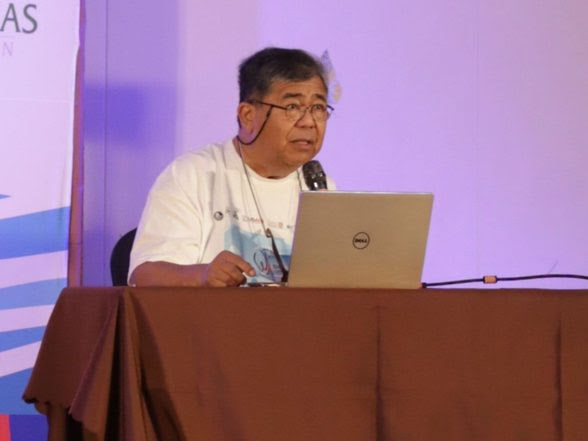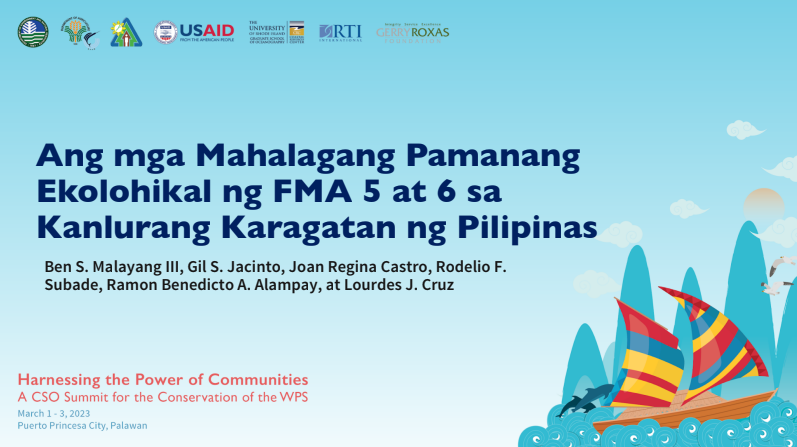
Protect West PH Sea ecosystem, collaborate despite maritime dispute —Policy expert

Ecosystems in the West Philippine Sea (WPS) should be protected by the Philippines and other nations interested in the WPS despite maritime disputes, said Dr. Ben Malayang III, a professor emeritus of environmental policy and governance at the Institute of Environmental and Marine Sciences (IEMS) of Silliman University (SU).
Malayang said discussions on the WPS should focus on collaboration to protect ecosystems in the WPS, which benefits not only the Philippines but the rest of the world.
“All contending parties must be reminded that in these seas are ecosystem services that benefit all of them…they need to be protected in spite of and while they’re contesting exclusionary interests over territories and jurisdictions,” said Malayang.
Ecosystem services are the direct and indirect contributions of an ecosystem to people.
Malayang presented the ecological value of the WPS and how benefits from ecosystems in the WPS go beyond the Philippines during the Civil Society Organization (CSO) Summit for the Conservation of the WPS, March 1-3, 2023 at Puerto Princesa City, Palawan.
Universal commons
Malayang said ecosystem services in the WPS are considered “universal commons” because the benefits from ecosystems in the WPS go beyond the WPS.

Hence, Malayang said the ecosystem services “need to be protected and sustained” by all.
Focusing on the universal commons, he said, would “hopefully shift” international attention towards protecting life forms and life systems in the sea, and ensuring “safe, regulated or legal access” to their ecosystem services which are “of high value to many.”
“There’s need to advance the narrative of collaboration on a universal commons…This is about caring for what’s ours that we could share with others. We need to advance this narrative over the current dominant one, which is about confrontations over exclusionary territorial and jurisdictional challenges,” said Malayang in his presentation.
Philippines as the lead
“The contesting parties must allow—and support and not impede—the Philippines to take the lead in protecting the ecosystem services of FMAs (Fisheries Management Areas) 5 and 6 in the West [Philippine] Sea,” Malayang said.
FMAs 5 and 6 cover the entire WPS, said Malayang, with some portions of FMA 5 covering some areas in the Sulu Sea.
In 2016, the arbitral tribunal under the United Nations Convention on the Law of the Sea (UNCLOS) upheld the Philippines’ sovereign rights and jurisdiction in the WPS, claimed by China as part of the South China Sea.
Seven years since the UNCLOS ruling, the Philippines continues to face resistance from China to acknowledge the ruling, grappling with China’s presence in the WPS.
Department of Foreign Affairs spokesperson Ma.Teresita Daza said in media reports that in 2022, the Philippines has lodged 195 diplomatic protests against China’s actions in the WPS.
“Confrontations” over territorial and jurisdictional challenges in the WPS, said Malayang, continue to be the “current dominant narrative.”
However, Malayang said this dominant narrative “threatens life and life support systems” in the WPS.
“There are contending territorial claims to parts of the SCS and challenges to the internationally recognized jurisdiction of the Philippines over the WPS. They’re creating grave economic and political security concerns in the world. To establish presence, some claimants and challengers are converting reefs and atolls into lands for habitation. They have created a regime of resource extraction that encourages illegal, unreported, and unregulated (IUU) fishing. These have decimated and depleted large areas of water once thriving with life. In these places, the once living sea is gone,” said Malayang in an opinion piece published by Rappler in November 2022.
Value
In his presentation, Malayang identified the ecological, economic, and social benefits people get from the WPS that define the value of WPS.
Aside from natural resources like fish for food and gas for energy, Malayang’s presentation showed benefits from WPS ecosystems like how the biodiversity in the WPS supports life in and around it; how it regulates the climate; shapes livelihood, culture, tourism, commerce, and industry.
“We used science-based indications of ecological, economic, and social worth from a review of literature covering these topics relating or relevant to the West Philippine Sea. We see a high heritage value of FMAs 5 and 6 in the (WPS),” said Malayang.
Malayang’s presentation was based on a study he conducted with Filipino scientists, including Dr. Gil Jacinto, former director and retired professor of Oceanography of the University of the Philippines Marine Science Institute (UP MSI); Dr. Joan Castro, executive vice president of Path Foundation Philippines, Inc.; Dr. Rodelio Subade, professor of Resource Economics at UP Visayas; Dr. Ramon Alampay, professor of tourism at the UP Asian Institute of Tourism; and Dr. Lourdes Cruz, national scientist and professor emeritus of Biochemistry at UP MSI.
“The presentation was to initiate CSO discussions on what they might do together to preserve and sustain the heritage value of FMAs 5 and 6 in the (WPS), as a universal commons to Filipinos and the larger south china sea community and beyond,” said Malayang.
Malayang is the principal investigator in South Negros for the Fish Right Program of the United States Agency for International Development (USAID) and the Bureau of Fisheries and Aquatic Resources (BFAR), in which SU is an academic partner.
USAID led the CSO Summit for the Conservation of the WPS, with the theme “Harnessing the Power of Communities,” which gathered more than 60 CSOs, over 100 representatives of the academe, women’s groups, farmers and fisherfolk, and Indigenous people based in areas facing the WPS: Northern Luzon, Mindoro, and Palawan.
Malayang served as the Department of Environment and Natural Resources (DENR) undersecretary from 1992 to 1995. He was also the 12th president of Silliman University from 2006 to 2018.


